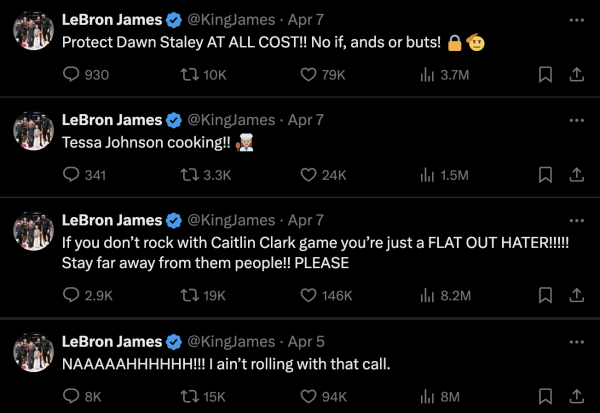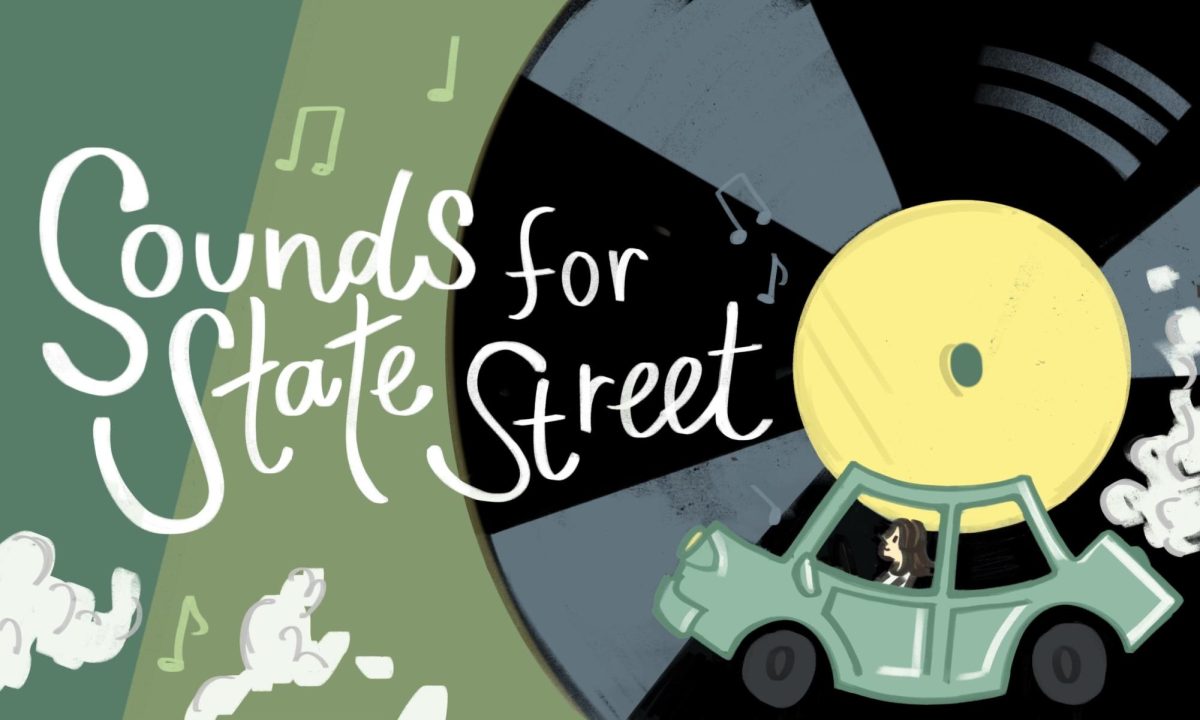On Sunday, April 7, Caitlin Clark and the Iowa Hawks left it all on the court in Cleveland Ohio, falling to the undefeated and remarkable South Carolina Gamecocks, 87-75. This final, where Clark posted a game-high 30 points, ended her college career, leaving behind an arguable case for being the greatest women’s college basketball player of all time. This final was also the most watched basketball game, men’s or women’s, college or professional, since 2019, bringing in an average 18.9 million viewers, peaking in the 4th quarter with 24.1 million viewers. The men’s game the next day only averaged 14.8 million viewers, just 600,000 viewers over Iowa’s victory against University of Connecticut’s Huskies in the Final Four.
This year’s March Madness women’s tournament made history for women’s sports. Viewership records were broken, yes, but I was even more impressed with the way people talked about women’s sports. Iconic ESPN sports journalist Steven A. Smith, who rarely mentions women’s sports, if ever, debated if Caitlin Clark was the G.O.A.T. Lakers legend Shaquille O’Neal said Angel Reese, a dominant force from Louisiana State University, is the greatest athlete to come out of LSU ever. Bleacher Report’s post of UConn’s Paige Bueckers’ stats amassed 27 thousand likes, a significant figure for sports posts on Twitter. Sports fans and media across the country were talking about women’s basketball.

When I planned this column’s focus in February, I wanted to focus solely on Caitlin Clark. At the time, she just broke the all-time college scoring record in women’s basketball. Just a few weeks later, she broke the all-time college scoring record, passing the male leader, Pete Maravich. It felt right to spotlight her accomplishments, and it still does.
But, as I watched March Madness unfold, I realized I had a bigger story at hand: the unconventional group of women dominating women’s basketball and the headlines about the tournament.
As a self-proclaimed lover of sports, I will freely admit that basketball is my least favorite popularized professional sport. I briefly watch and read about March Madness each year because of my interest in who will be closest to having a perfect bracket. This year though, the women’s storylines caught my eye. Will Iowa get its revenge against LSU, who beat them in the final last year? Can Paige Bueckers and UConn turn it up and reach the championship? Who can stop Caitlin Clark? What would or could the Washington Post publish about LSU coach Kim Mulkey? Can Flau’jae and Angel run it back?
Despite the Caitlin Clark craze, it was not only about her, and that’s what made this March Madness so special. There were storylines coming from every side of the country, bringing in fans from all over.
What’s important now is maintaining this momentum. I worry that because Caitlin, Angel, Stanford’s Cameron Brink, South Carolina’s Kamilla Cardoso, and more will go to the league, while stars like Paige Bueckers stay behind in college, the spark will die out. And we cannot let that happen.
The WNBA, who has been the butt of many jokes about women’s sports, can rise from being a league not-comparable to the NBA to something like this year’s March Madness. By continuing to engage in dialogue about women’s basketball players like we do men’s, by critiquing them, laughing at them, and arguing about them, we can make the bright future of women’s basketball a reality.
For a long time, we’ve tried to support female athletes, but to me, where we’ve fallen short of the most is the discourse around their play. In a way, women athletes are spared from intense criticism, wanting to protect a ‘young female.’ For true equality, we can continue our March Madness conversations and bring them to the WNBA. And if we want to go beyond that, we don’t have to stop at just basketball.




























![Dr. Zanita Kelly, Director of Lower and Middle School, pictured above, and the rest of Westridge Administration were instrumental to providing Westridge faculty and staff the support they needed after the Eaton fire. "[Teachers] are part of the community," said Dr. Kelly. "Just like our families and students."](https://westridgespyglass.org/wp-content/uploads/2025/03/dr.-kellyyy-1-e1748143600809.png)






























